现在完成时用法
现在完成时用法总结

现在完成时用法总结现在完成时用法总结总结是指社会团体、企业单位和个人在自身的某一时期、某一项目或某些工作告一段落或者全部完成后进行回顾检查、分析评价,从而肯定成绩,得到经验,找出差距,得出教训和一些规律性认识的一种书面材料,它可以使我们更有效率,不如立即行动起来写一份总结吧。
我们该怎么去写总结呢?下面是小编整理的现在完成时用法总结,欢迎大家分享。
一、基本结构:主语+have/has+动词的过去分词①肯定句:主语+have/has+动词的过去分词+宾语.②否定句:主语+have/has+not+动词的过去分词)+宾语.③一般疑问句:Have/Has+主语+动词的过去分词+宾语.④特殊疑问句:特殊疑问词或词组+一般疑问句(have/has+主语+过去分词(V-ed)+其他)过去分词变化规则如下:1 、规则动词:规则动词的过去分词的构成规则与规则动词的过去式的构成规则相同。
四点变化规则:(1)一般动词,在词尾直接加“ ed ”。
work---worked---worked , visit---visited---visited(2)以“ e ”结尾的动词,只在词尾加“ d ”。
live---lived---lived(3)以“辅音字母+ y ”结尾的动词,将"y" 变为"i" ,再加“ ed ”。
study---studied---studied , cry---cried---cried(4)重读闭音节结尾,末尾只有一个辅音字母,先双写该辅音字母,再加“ ed ”。
stop---stopped---stopped , drop---dropped--dropped2 、不规则动词变化需参看不规则动词表逐一熟记。
例如:cut- cut- cut, hit-- hit-- hit二、用法1 、现在完成时用来表示过去发生或已经完成的动作对现在造成影响或后果。
也就是说,动作或状态发生在过去但它的影响现在还存在,强调的是现在。
现在完成时的用法和示例

现在完成时的用法和示例现在完成时(Present Perfect Tense)是英语中常用的时态之一,用于表达过去发生或完成的动作与现在的联系。
本文将介绍现在完成时的基本用法,并提供一些例子来帮助读者更好地理解该时态。
一、现在完成时的基本用法1. 表示过去完成的动作或经历对现在造成的影响或结果。
例如:- I have lost my key.(我丢了我的钥匙。
现在我无法开锁了。
)- She has broken her leg.(她摔断了腿。
现在她只能坐在轮椅上。
)2.表示已经完成的动作对现在的结果或情况产生影响。
例如:- They have finished their homework.(他们已经完成了作业。
现在可以玩了。
)- He has left the company.(他离开了这家公司。
现在我们需要找个新员工。
)3.表示过去的经历或经验对现在的认知或理解。
例如:- I have visited Paris.(我去过巴黎。
现在我对巴黎有了更深刻的了解。
)- Have you ever tried sushi?(你尝试过寿司吗?现在你知道寿司的味道了吧。
)4.表示过去开始的动作一直延续到现在,或者表达一个在过去开始的动作一直持续到现在的状态。
例如:- I have lived in New York for five years.(我在纽约住了五年了。
) - They have been friends since childhood.(他们从小就是朋友了。
)二、示例以下是一些例句,通过这些例句,读者可以更好地理解现在完成时的用法。
1. 表示已经完成的动作对现在的结果或情况产生影响:- I have cooked dinner.(我已经做好晚饭了。
)- She has bought a new car.(她买了一辆新车。
)2. 表示过去完成的动作或经历对现在造成的影响或结果:- They have traveled around the world.(他们已经环游了世界。
现在完成时的用法

现在完成时的用法现在完成时(Present Perfect Tense)是英语中一个重要的时态,用来表示过去发生的一个动作、事件、经验或状态与现在的关系。
它通常由助动词“have/has”加上动词的过去分词构成。
现在完成时的使用包括以下几种情况。
1. 表示过去开始,现在仍然持续的动作或状态。
例如:我已经学习英语很多年了。
I have studied English for many years.2. 表示过去发生的动作或事件与现在的结果或影响之间的联系。
例如:我已经完成了作业,现在可以去玩了。
I have finished my homework, so I can play now.3. 表示过去曾经发生过的动作或事件,时间不明确或不重要。
例如:我去过巴黎。
I have been to Paris.4. 表示过去曾经多次或一段时间内反复发生的动作。
例如:我已经看过这部电影两次了。
I have watched this movie twice.5. 表示过去发生的动作对当前情况或经验的影响。
例如:我看过这个电影,所以我知道它的故事情节。
I have seen this movie, so I know its storyline.6. 表示过去的经验对现在的认知、态度或理解的影响。
例如:我尝试过这种食物,所以我知道它的味道。
I have tried this food, so I know its taste.7. 表示过去发生过的动作或事件与现在有关的时间段之内。
例如:一直到现在,我从来没有去过美国。
I have never been to the USA until now.8. 表示过去发生的动作或事件与现在正在进行的动作之间的关系。
例如:我已经吃过晚饭了,现在我正在看电视。
I have already had dinner and now I am watching TV.需要注意的是,现在完成时强调的是对现在的影响或结果,而不是对过去事件本身的描述。
现在完成时的用法

一、现在完成时:1 定义:过去发生的事情对现在有影响或结果。
2现在完成时的构成:助动词have/has +P.P.(规则/不规则)否定not,疑问提前3标志词:already/yet/just/ever/never/before/for+时间段/since +过去的时间点(一)现在完成时的用法一1:表示过去发生或已经完成的某一动作对现在造成的影响或结果。
此时,常与时间副词already(已经/肯),yet(还、已经/否,疑句),just(刚刚、仅仅) ,ever(曾经),never(从不),before(以前)等连用。
1)I've already read this book. 我已经读过这本书了。
(“读”这一动作发生在过去,对现在造成的影响是“知道书中的内容”。
)2)I've washed my clothes already.我已经洗了衣服。
(洗衣服的动作已完成,其结果是“衣服冼干净了”。
)(二)现在完成时用法二2——持续性用法(肯定句,疑问句中谓语动词必须是延续性动词):表示过去已经开始,持续到现在的动作或状态。
此时常与“for +一段时间 或“since+过去的点时间或从句(从句用一般过去时)以及so far(到目前为止)等时间状语连用。
for + 段时间since +点时间实例:1)I've lived here since 1990.自从1990年以来我就住在这里。
= I've lived here since 13 years ago.= I've lived here for 13 years.= It is 13 years since I began to live here.2)I haven't seen him for three years .我三年没有看见他了。
= I haven't seen him since three years ago= I haven't seen him since 2000.= It is 3 years since I saw him last time.3)Mr Wang has worked in the factory since he came to the city .自从到这个城市以来,王先生一直在这家工厂工作。
现在完成时的用法
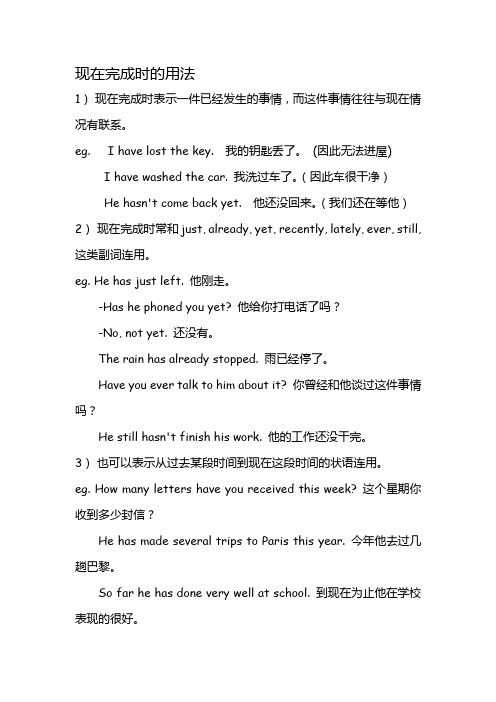
现在完成时的用法1)现在完成时表示一件已经发生的事情,而这件事情往往与现在情况有联系。
eg. I have lost the key. 我的钥匙丢了。
(因此无法进屋)I have washed the car. 我洗过车了。
(因此车很干净)He hasn't come back yet. 他还没回来。
(我们还在等他)2)现在完成时常和just, already, yet, recently, lately, ever, still, 这类副词连用。
eg. He has just left. 他刚走。
-Has he phoned you yet? 他给你打电话了吗?-No, not yet. 还没有。
The rain has already stopped. 雨已经停了。
Have you ever talk to him about it? 你曾经和他谈过这件事情吗?He still hasn't finish his work. 他的工作还没干完。
3)也可以表示从过去某段时间到现在这段时间的状语连用。
eg. How many letters have you received this week? 这个星期你收到多少封信?He has made several trips to Paris this year. 今年他去过几趟巴黎。
So far he has done very well at school. 到现在为止他在学校表现的很好。
4)现在完成时还常和for,since 引导的时间状语或者与how long 连用。
eg. I haven't seen you for ages. 我好久没看见你了。
He hasn't cleaned his room for months. 他有好几个月没打扫房间了。
We have lived here for over ten years. 我们在这里住了十多年了。
现在完成时的用法

二、现在完成时的三个分清: 一般过去时表示的是过去发生的动 作或状态,和现在不发生联系,它 可以和表示过去的时间状语连用。 I have seen the film.(我了解 这部电影的内容。) I saw the film last week.(只 说明上星期看了这部电影,不涉及 现在的情况。)
初中教材中常见的终止性动词,可以编成口 诀: 晨起 离家去 购物,出生入 死 搬 回来。 东西一到 开始用,花完未够 方可 借。 get up→be up leave→be away (from) go→ be buy →have join→be in /be a +n. die →be dead move→be out ofreturn→be back come→be arrive→be here start/begin→be on finish→/end→be over borrow→keep
开始 结束 死 买 卖,来 去 借 入 不 离开。 get up→be up leave→be away (from) go→ be buy →have join→be in /be a +n. die →be dead move→be out of return→be bcome→be arrive→be here start/begin→be on finish→/end→be over borrow→keep 例如:The old man has died for five years.( × ) The old man has been dead for five years.( √ ) 注明:非延续性动词在否定结构中可用于现在完成时 态:I haven’t bought anything for two days.
现在完成时的用法及常见句型总结

现在完成时的用法及常见句型总结现在完成时是英语中常用的时态之一,表示过去发生的动作或事件对现在造成的影响或结果。
在本文中,我们将总结现在完成时的用法和常见句型。
一、用法:1. 表示过去发生的动作或事件对现在的影响,即强调动作或事件的结果在现在仍然存在或持续发生。
例句:I have lost my key.(我丢了我的钥匙,现在找不到)She has been to Japan.(她曾去过日本,现在还记得日本的经历)2. 表示过去一段时间内发生的动作或事件,但并不强调具体的时间点。
例句:We have studied English for five years.(我们已经学英语五年了)He has written three novels.(他已经写了三本小说)3. 表示过去发生的动作或事件对现在仍然具有重要性或关联。
例句:I have seen that movie three times.(我看过那部电影三次了,说明对该电影有兴趣或思考)She has lived in this city since 2005.(她自2005年以来一直住在这个城市)二、常见句型:1. 肯定句结构:主语 + have/has + 过去分词例句:I have completed my homework.(我已经完成作业)They have visited Paris.(他们已经参观过巴黎)2. 否定句结构:主语 + have/has + not + 过去分词例句:She has not finished her project yet.(她还没完成她的项目)We have not seen him for a long time.(我们很久没见他了)3. 疑问句结构:Have/Has + 主语 + 过去分词 + 其他?例句:Have you ever been to New York?(你去过纽约吗?)Has he finished his report?(他完成报告了吗?)4. 现在完成时与时间状语连用,常用的时间状语有:already(已经),just(刚刚),recently(最近),ever(曾经),never(从未),for(表示时间段),since(自从...以来)。
现在完成时的用法
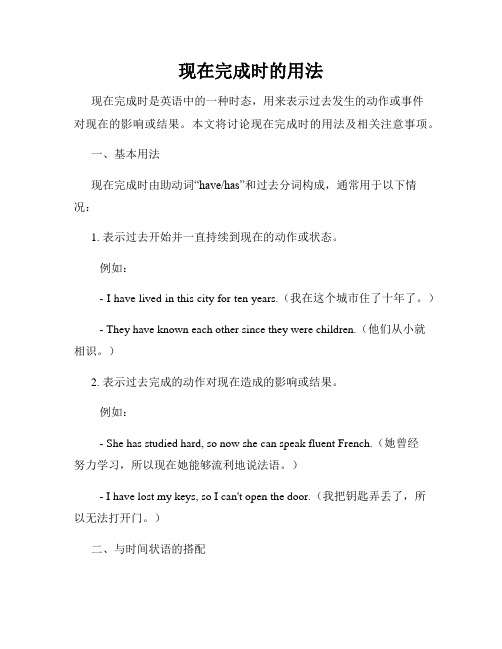
现在完成时的用法现在完成时是英语中的一种时态,用来表示过去发生的动作或事件对现在的影响或结果。
本文将讨论现在完成时的用法及相关注意事项。
一、基本用法现在完成时由助动词“have/has”和过去分词构成,通常用于以下情况:1. 表示过去开始并一直持续到现在的动作或状态。
例如:- I have lived in this city for ten years.(我在这个城市住了十年了。
) - They have known each other since they were children.(他们从小就相识。
)2. 表示过去完成的动作对现在造成的影响或结果。
例如:- She has studied hard, so now she can speak fluent French.(她曾经努力学习,所以现在她能够流利地说法语。
)- I have lost my keys, so I can't open the door.(我把钥匙弄丢了,所以无法打开门。
)二、与时间状语的搭配现在完成时经常与表示过去发生的时间状语连用,具体可以分为以下几种情况:1. 点时间状语:表示具体的某个时间点。
例如:- I have visited Beijing three times.(我已经去过北京三次了。
) - She has finished her homework just now.(她刚刚完成了作业。
)2. 时间段状语:表示某一段时间的延续。
例如:- They have been friends for many years.(他们已经是多年的朋友了。
)- We haven't seen each other since last summer.(我们自去年夏天以来就没见面了。
)3. 到目前为止的状语:表示从过去某一时间到现在为止。
例如:- He has already eaten lunch.(他已经吃过午饭了。
现在完成时的用法与例句
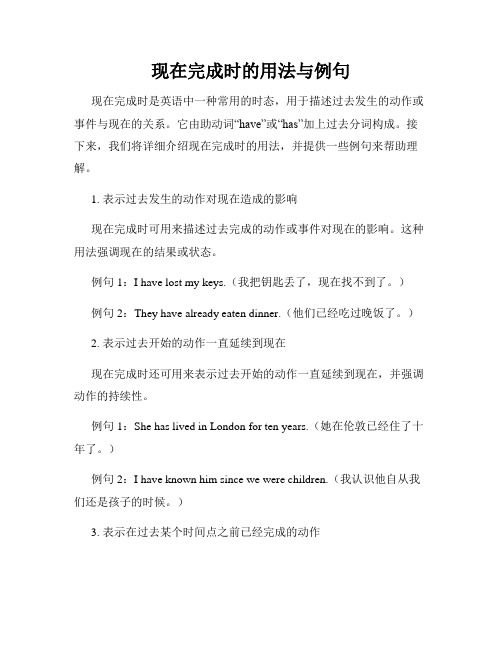
现在完成时的用法与例句现在完成时是英语中一种常用的时态,用于描述过去发生的动作或事件与现在的关系。
它由助动词“have”或“has”加上过去分词构成。
接下来,我们将详细介绍现在完成时的用法,并提供一些例句来帮助理解。
1. 表示过去发生的动作对现在造成的影响现在完成时可用来描述过去完成的动作或事件对现在的影响。
这种用法强调现在的结果或状态。
例句1:I have lost my keys.(我把钥匙丢了,现在找不到了。
)例句2:They have already eaten dinner.(他们已经吃过晚饭了。
)2. 表示过去开始的动作一直延续到现在现在完成时还可用来表示过去开始的动作一直延续到现在,并强调动作的持续性。
例句1:She has lived in London for ten years.(她在伦敦已经住了十年了。
)例句2:I have known him since we were children.(我认识他自从我们还是孩子的时候。
)3. 表示在过去某个时间点之前已经完成的动作现在完成时也可以表示在过去某个时间点之前已经完成的动作,而时间点可以是具体的或不具体的。
例句1:He has already finished his homework.(他已经完成了作业。
)例句2:We have never been to Japan.(我们从未去过日本。
)4. 表示经历或体验过的动作或事件现在完成时还可以用来表达对某个动作或事件的经历或体验。
例句1:She has traveled to many countries.(她游览过许多国家。
)例句2:I have seen that movie before.(我之前看过那部电影。
)5. 与表示一段时间的状语连用现在完成时可以与表示一段时间的状语连用,表达在这段时间内已经完成了某个动作或事件。
例句1:They have worked together for five years.(他们已经一起工作了五年。
现在完成时的用法

现在完成时的用法现在完成时是英语中的一种时态,用于描述发生在过去某个时间点之前但对现在仍然有影响的动作或状态。
本文将详细介绍现在完成时的用法及相关注意事项。
一、现在完成时的基本结构现在完成时的基本结构由助动词"have"(或其缩写形式"has")+ 过去分词构成。
具体结构如下:肯定句:主语 + have/has + 过去分词否定句:主语 + have not/has not + 过去分词疑问句:Have/Has + 主语 + 过去分词例如:- I have visited London.(我已经去过伦敦。
)- She hasn't finished her homework.(她还没完成作业。
)- Have you ever tried sushi?(你尝试过寿司吗?)二、1. 表示过去开始并一直延续到现在的动作或状态。
例:He has worked at the company for 10 years.(他在这家公司工作已经有10年了。
)2. 表示已经发生的经历或经历过的事情。
例:I have been to Paris twice.(我去过巴黎两次。
)3. 描述过去发生但对现在有影响的动作或状态。
例:They have just finished their project.(他们刚刚完成了他们的项目。
)4. 表示刚刚完成的动作或刚刚发生的事情。
例:We have just moved into a new house.(我们刚刚搬进了新家。
)5. 表示在过去某个时间点之前已经完成的动作或事情。
例:She has already bought the tickets.(她已经买好了票。
)6. 用于带有时间状语的句子,表示在过去某一段时间内已经完成的动作或事情。
例:He has read three books this month.(这个月他已经读了三本书。
完整版)现在完成时的用法详解

完整版)现在完成时的用法详解现在完成时是英语中的一种时态,表示动作或状态已经发生,对现在产生影响或有关联。
下面是现在完成时的用法详解:一、构成和用法:现在完成时由助动词“have/has”加上动词的过去分词构成。
下面是不同人称的构成方式:I/we/you/they + have + 过去分词He/she/it + has + 过去分词现在完成时的用法包括以下几个方面:1.表示过去发生的动作对现在产生的影响或结果:I have ___(我已经完成作业了)2.表示过去开始的动作一直延续到现在并可能继续下去:She has lived in New York for five years.(她在纽约已经住了五年了)3.表示经历过的经历或动作:Have you ever been to Paris?(你去过巴黎吗?)4.表示已完成的动作或状态:They have already left.(他们已经走了)二、使用注意事项:使用现在完成时需要注意以下几点:1.不能和过去时间状语连用:He has already left yesterday.(错误)应改为He left yesterday.(正确)2.不能和表示过去具体的时间连用:I have seen her last night.(错误)应改为I saw her last night.(正确)3.可以和表明时间段的时间状语连用:I have lived here for three years.(我在这里住了三年了)4.可以和表示过去到现在一段时间的时间状语连用:I have known him since 2010.(从2010年起我就认识他)以上就是现在完成时的用法详解,希望对你有帮助。
现在完成时的用法
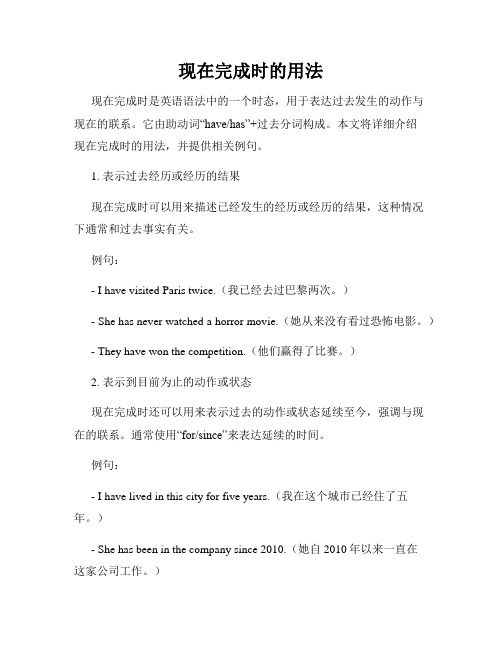
现在完成时的用法现在完成时是英语语法中的一个时态,用于表达过去发生的动作与现在的联系。
它由助动词“have/has”+过去分词构成。
本文将详细介绍现在完成时的用法,并提供相关例句。
1. 表示过去经历或经历的结果现在完成时可以用来描述已经发生的经历或经历的结果,这种情况下通常和过去事实有关。
例句:- I have visited Paris twice.(我已经去过巴黎两次。
)- She has never watched a horror movie.(她从来没有看过恐怖电影。
)- They have won the competition.(他们赢得了比赛。
)2. 表示到目前为止的动作或状态现在完成时还可以用来表示过去的动作或状态延续至今,强调与现在的联系。
通常使用“for/since”来表达延续的时间。
例句:- I have lived in this city for five years.(我在这个城市已经住了五年。
)- She has been in the company since 2010.(她自2010年以来一直在这家公司工作。
)- They have known each other for a long time.(他们认识彼此已经很长时间了。
)3. 表示刚刚发生的动作现在完成时还可以用来表达刚刚发生的动作或事件,尤其是在口语中。
例句:- I have just finished my homework.(我刚刚完成了作业。
)- He has already left for work.(他已经去上班了。
)- Have you ever tried Chinese food?(你尝试过中国食物吗?)4. 使用时间状语与现在完成时连用现在完成时通常和一些表示时间的状语连用,以明确动作发生的具体时间或者时间范围。
例句:- She has studied English since she was a child.(她从小就开始学习英语。
现在完成时的用法

现在完成时的用法:构成:三人称单数主语+has+过去分词主语(复数)+have+过去分词肯定句: 疑问句:She/he/it has worked Has he/she/it worked?I/you/we/they worked. Have I/we/ you/they worked?否定句:She/he/it has not workedI/you/we/they not worked.现在完成时的基本用法:1.现在完成时的已完成用法A.强调不久前完成的动作对现在产生的影响,常与just,already,yet(用于否定句和疑问句)连用,谓语动词用终止性动词.He has just gone out.他刚刚出去.I have already finished my lunch.我已经吃过午饭了.Have you heard the news yet?你听到这个消息了吗?B.强调直到现在为止的生活经历,常与never(从不),ever(曾经)(用于否定和疑问句),(only)once(一次),twice(两次),three times(三次)等连用,可以用how many times 提问,谓语动词用延续性动词.He has never been late for school.他上学从未迟到过.Have you ever limbed that mountain?你爬过那座山吗?Yes,several times.是的,爬过几次.How many times have you ever been to England.你曾经去过英国几次?Only once.只去过一次.2.现在完成时的未完成用法.表示动作或状态从过去某时开始,一直延续至今,可能刚刚结束,也可能继续下去.常与for,since引导的时间状语连用,可以用how long提问,谓语动词时用延续性动词.How long have you lived here?你在这里住了多久.I have lived here for about ten years.我在这里住了大约十年.We have been very busy since the new term began.新学期开始以来,我们很忙.使用现在完成时需注意的问题:1.现在完成时和一般过去时的区别两者所表示的动作都发生在过去,但现在完成时强调这一动作与现在的关系,对现在产生的影响,结果等,所以不能与表过去的时间状语连用;一般过去时只表示过去的事实,不表示与现在的关系,可以和表示过去的时间状语连用.Have you seen the TV play?你看过这部电视剧吗?Yes,I have.是的,我看过.When did you see it?你什么时候看的?I saw it last year.我去年看的.2.终止性动词的完成时终止性动词的肯定式通常不能与表示一段时间的for短语,since短语或从句等连用,因为终止性动词不能表示延续状态,它只能用现在完成时表示已经做了或还没有做,而不能表达做了多久,但在否定句中就没有这个限制.I have been a member of the Youth V olunteers for five years.我是五年前加入青年志愿者队伍的.I have joined the Youth V olunteers for five years.(错)I joined the Youth V olunteers five years ago.常有终止性动词有:Borrow,put,arrive,leave,stand up,sit down,learn,die,come back,sit down…Have gone to与have been to的区分:Have gone to 表示去了人未回来,have been to表示去了好几次,人已经回来了. It can’t be John,he has gone to town.那不可能是John,他进城去了.John knows the way well,he has been to the city before.John知道那里的路,他以前去过那城市。
现在完成时态用法

现在完成进行时的主要用法
表示一个持续了一段时间,刚刚结束或仍在继续 进行的动作。与现在完成时有所不同的是现在完 成进行时强调动作本身或动作的持续性、持久性。
eg:1. We’ve been looking for you everywhere.where have you been?
我们一直在到处找你,你上哪儿去了?
eg: 1. I have learnt English for three years. 我学英语(到现在)三年了(仍在学)。 2. I learnt English for three years. 我学了三年英语(现在不学了)。 3. I have written two letters this morning 今天上午我写了两封信,(说话时仍是上午)。 4. I wrote two letters this morning . 今天上午我写了两封信,(下午或晚上说的)。 注:表示不确定时间的状语,在句中无其它特定的 过去时间状语时,或无表示过去动作的从句时常与 现在完成时连用。 eg: 1. I have not written to my parents recently. 我最近一直未给父母写信。 2. I have met him many times before. 我以前见过他多次。
12.Christianity has become a worldwide religion since it
__almost two years ago. A.has begin B.begins C.began D.begin
13.Shakespeare __many plays such as Hamlet,and Romeo And Juliet. A.writes B.have written C.wrote D.has written 14.When we lived in phoenix we __at Arizona State university. A.studied B.have studied C.study D.were studying
现在完成时的四种用法
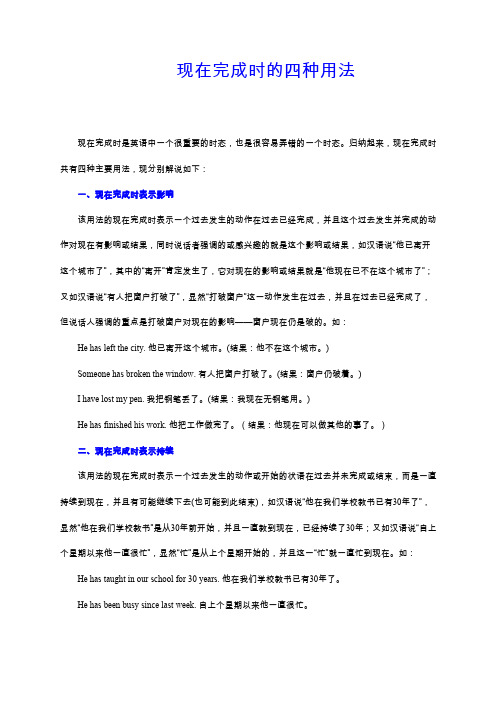
现在完成时的四种用法现在完成时是英语中一个很重要的时态,也是很容易弄错的一个时态。
归纳起来,现在完成时共有四种主要用法,现分别解说如下:一、现在完成时表示影响该用法的现在完成时表示一个过去发生的动作在过去已经完成,并且这个过去发生并完成的动作对现在有影响或结果,同时说话者强调的或感兴趣的就是这个影响或结果,如汉语说“他已离开这个城市了”,其中的“离开”肯定发生了,它对现在的影响或结果就是“他现在已不在这个城市了”;又如汉语说“有人把窗户打破了”,显然“打破窗户”这一动作发生在过去,并且在过去已经完成了,但说话人强调的重点是打破窗户对现在的影响——窗户现在仍是破的。
如:He has left the city. 他已离开这个城市。
(结果:他不在这个城市。
)Someone has broken the window. 有人把窗户打破了。
(结果:窗户仍破着。
)I have lost my pen. 我把钢笔丢了。
(结果:我现在无钢笔用。
)He has finished his work. 他把工作做完了。
(结果:他现在可以做其他的事了。
)二、现在完成时表示持续该用法的现在完成时表示一个过去发生的动作或开始的状语在过去并未完成或结束,而是一直持续到现在,并且有可能继续下去(也可能到此结束),如汉语说“他在我们学校教书已有30年了”,显然“他在我们学校教书”是从30年前开始,并且一直教到现在,已经持续了30年;又如汉语说“自上个星期以来他一直很忙”,显然“忙”是从上个星期开始的,并且这一“忙”就一直忙到现在。
如:He has taught in our school for 30 years. 他在我们学校教书已有30年了。
He has been busy since last week. 自上个星期以来他一直很忙。
英语微信群是目前学习英语最有效的方法,群里都是说英语,没有半个中文,而且规则非常严格,是一个超级不错的英语学习环境,群里有好多英语超好的超牛逼的人,还有鬼佬和外国美眉。
现在完成时四种用法和搭配

现在完成时四种用法和搭配一、掌握四种用法现在完成时有两种主要用法,即已完成用法(或影响性用法)和未完成用法(或持续性用法)。
四种具体用法如下:1. 影响性用法该用法表示某个动作发生于过去,完成于过去,但这个过去发生并完成的动作对现在有影响或结果,同时说话者强调的或感兴趣的就是这个影响或结果。
如:He has gone home. 他回家去了。
(其影响或结果:现在不在这里)I have seen the film. 我看过这部电影。
(其影响或结果:我知道其内容)He has finished his homework. 他完成作业了。
(其影响或结果:可以做其他事情了)2. 持续性用法该用法表示某动作发生于过去,但并未在过去完成,而是一直持续到现在,并且有可能继续下去(也可能到此结束)。
如:He has been blind from birth. 他生下来就双目失明。
He has lived here for five years. 他已在这儿住了5年。
He has worked in films all his life. 他在电影界干了一辈子。
3. 重复性用法该用法表示在过去反复发生的动作,并且这个动作的反复性一直延续至今。
如:My father has always gone to work by bike. 我父亲一向骑车上班。
I have always found him difficult. 我老是感到他这人很难相处。
4. 将来性用法该用法主要见于时间或条件状语从句中,用以表示一个将来完成的动作。
如:I’ll tell you when I’ve finished. 我完成的时候会告诉你。
If she hasn’t gone to bed when you see her, tell her to give me a ring. 如果你见到她时她还没睡觉,让她给我打个电话。
二、记住两类搭配1. 通常与现在完成时搭配的副词与现在完成时通常搭配的副词有already, never, ever, just, before,recently等。
现在完成时的用法和意义
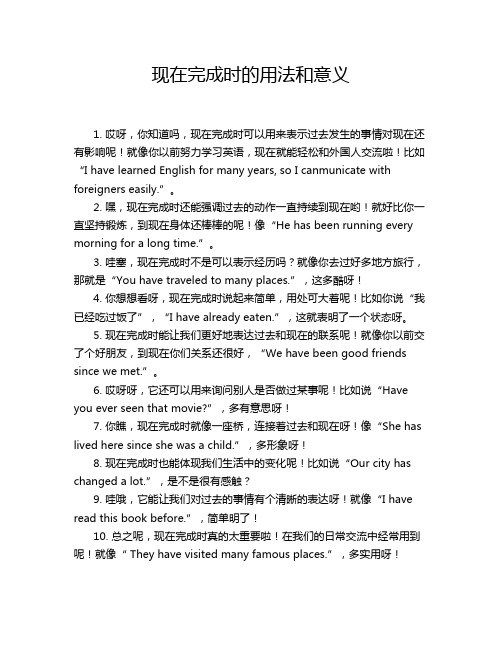
现在完成时的用法和意义1. 哎呀,你知道吗,现在完成时可以用来表示过去发生的事情对现在还有影响呢!就像你以前努力学习英语,现在就能轻松和外国人交流啦!比如“I have learned English for many years, so I canmunicate with foreigners easily.”。
2. 嘿,现在完成时还能强调过去的动作一直持续到现在哟!就好比你一直坚持锻炼,到现在身体还棒棒的呢!像“He has been running every morning for a lo ng time.”。
3. 哇塞,现在完成时不是可以表示经历吗?就像你去过好多地方旅行,那就是“You have traveled to many places.”,这多酷呀!4. 你想想看呀,现在完成时说起来简单,用处可大着呢!比如你说“我已经吃过饭了”,“I have already eaten.”,这就表明了一个状态呀。
5. 现在完成时能让我们更好地表达过去和现在的联系呢!就像你以前交了个好朋友,到现在你们关系还很好,“We have been good friends since we met.”。
6. 哎呀呀,它还可以用来询问别人是否做过某事呢!比如说“Have you ever seen that movie?”,多有意思呀!7. 你瞧,现在完成时就像一座桥,连接着过去和现在呀!像“She has lived here since she was a child.”,多形象呀!8. 现在完成时也能体现我们生活中的变化呢!比如说“Our city has changed a lot.”,是不是很有感触?9. 哇哦,它能让我们对过去的事情有个清晰的表达呀!就像“I have read th is book before.”,简单明了!10. 总之呢,现在完成时真的太重要啦!在我们的日常交流中经常用到呢!就像“ They have visited many famous places.”,多实用呀!我的观点结论就是:现在完成时在英语中真的超级重要,我们一定要好好掌握它的用法和意义呀,这样才能让我们的英语更上一层楼!。
现在完成时的用法及例句
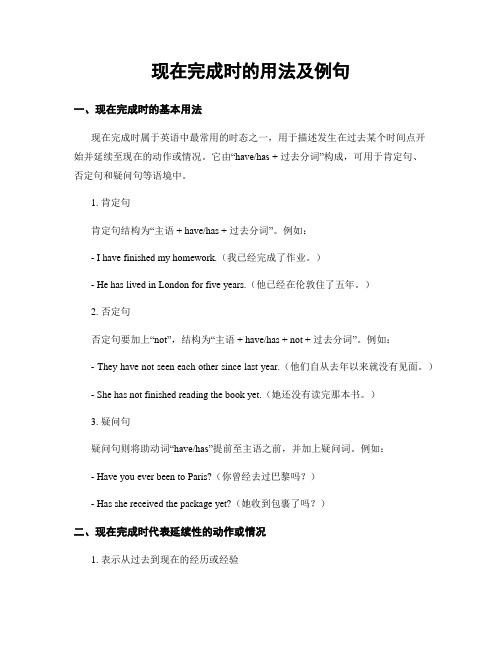
现在完成时的用法及例句一、现在完成时的基本用法现在完成时属于英语中最常用的时态之一,用于描述发生在过去某个时间点开始并延续至现在的动作或情况。
它由“have/has + 过去分词”构成,可用于肯定句、否定句和疑问句等语境中。
1. 肯定句肯定句结构为“主语 + have/has + 过去分词”。
例如:- I have finished my homework.(我已经完成了作业。
)- He has lived in London for five years.(他已经在伦敦住了五年。
)2. 否定句否定句要加上“not”,结构为“主语 + have/has + not + 过去分词”。
例如:- They have not seen each other since last year.(他们自从去年以来就没有见面。
)- She has not finished reading the book yet.(她还没有读完那本书。
)3. 疑问句疑问句则将助动词“have/has”提前至主语之前,并加上疑问词。
例如:- Have you ever been to Paris?(你曾经去过巴黎吗?)- Has she received the package yet?(她收到包裹了吗?)二、现在完成时代表延续性的动作或情况1. 表示从过去到现在的经历或经验现在完成时常用于描述一个人在过去某个时间开始并延续至今的经历或经验。
例如:- I have traveled to many countries.(我去过很多国家。
)- She has studied English since she was a child.(她从小就学习英语。
)2. 表示动作刚刚结束现在完成时也可用于表示刚刚发生、刚刚结束的动作,强调此动作对现在造成的影响。
例如:- I have just finished cooking dinner.(我刚煮完晚餐。
英语现在完成时用法总结
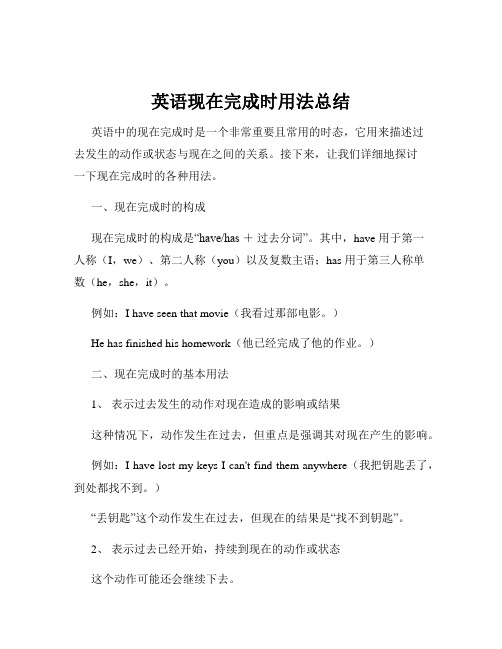
英语现在完成时用法总结英语中的现在完成时是一个非常重要且常用的时态,它用来描述过去发生的动作或状态与现在之间的关系。
接下来,让我们详细地探讨一下现在完成时的各种用法。
一、现在完成时的构成现在完成时的构成是“have/has +过去分词”。
其中,have 用于第一人称(I,we)、第二人称(you)以及复数主语;has 用于第三人称单数(he,she,it)。
例如:I have seen that movie(我看过那部电影。
)He has finished his homework(他已经完成了他的作业。
)二、现在完成时的基本用法1、表示过去发生的动作对现在造成的影响或结果这种情况下,动作发生在过去,但重点是强调其对现在产生的影响。
例如:I have lost my keys I can't find them anywhere(我把钥匙丢了,到处都找不到。
)“丢钥匙”这个动作发生在过去,但现在的结果是“找不到钥匙”。
2、表示过去已经开始,持续到现在的动作或状态这个动作可能还会继续下去。
例如:I have lived here for five years(我在这里住了五年了。
)“居住”这个动作从过去开始,一直持续到现在。
3、表示经历或经验例如:She has visited many countries(她游览过很多国家。
)三、常与现在完成时连用的时间状语1、 already(已经),通常用于肯定句中例如:I have already finished my work(我已经完成了我的工作。
)2、 yet(还,尚未),用于疑问句和否定句中例如:Have you finished your homework yet?(你作业做完了吗?)I haven't eaten yet(我还没吃。
)3、 just(刚刚)例如:He has just left(他刚刚离开。
)4、 ever(曾经)例如:Have you ever been to Beijing?(你曾经去过北京吗?)5、 never(从不)例如:I have never seen such a beautiful place(我从未见过如此美丽的地方。
- 1、下载文档前请自行甄别文档内容的完整性,平台不提供额外的编辑、内容补充、找答案等附加服务。
- 2、"仅部分预览"的文档,不可在线预览部分如存在完整性等问题,可反馈申请退款(可完整预览的文档不适用该条件!)。
- 3、如文档侵犯您的权益,请联系客服反馈,我们会尽快为您处理(人工客服工作时间:9:00-18:30)。
七嘴八舌
1. I __h_a_v_e__b_ee_n__ (be) busy these days. I _h_a_v_e_n_’_t_g_o_n_e_ (not go) to the cinema for weeks.
2. How many units _h_a_v_e__ you ___le_a_r_n_t (learn) so far? 3. Lily with her parents _h_a_s__g_o_n_e(go) to Sanya . They will
be back in five days. 4. Nobody __h_a_s__d_iv_e_d_(dive) in our class before. 5. Alice h_a_s__m_a_d_e__(make) several friends since she _ca_m__e__
(come) to China. 6. __H__a_s___ your brother___d_r_iv_e_n__(drive) a horse before? 7. They ___h_a_v_e__st_a_y_e_d___(stay) in the park during the past
die—be dead get up—be up put on—be on
come / get back—be back go to town—be in town
lose—be missing
catch a cold—have a cold
close—be closed / not open open—be open
fall ill / asleep— be ill / asleep begin /start—be on
get /receive a letter from—have a letter from
B、come to —be here / there
arrive in (at)/ get to / reach——be here / there
通常不与表示一段时间的时间状语连用。
I have bought a CD player. 若要与一段时间连用需转换为: I have had the CD player for seven years.
五、延续性动词和短暂性动词转换归纳。
A、leave— been away from buy—have borrow—keep
join the army-------be in the army/ be a soldier
join the League-----be in the League / be a league member
5. 常见的时间状语
最近:lately, recently; 迄今为止,到目前为止: so far, up to now, till now; 还有never , before, 等。
I have finished my homework. 我完成了我的家庭作业 He has returned the book . 我归还了那本书 His father has died .
他父亲死了 Her mother has bought a new dress for her.
她母亲给她买了一件衣服
Unit 9
现在完成时态的用法
陈述句: 主语+have( has)(not)+过去分词+其它。 have not=haven’t has not=hasn’t.
一般疑问句: Have( Has )+主语+过去分词+其它?
特殊疑问句: 特殊疑问词+have(has) +主语+ 过去分词+其它?
用法一:表示动作刚刚完成,或者已经完成的动作对现在造成的 影响。
4. yet: 还; 仍然。 常用于否定句和疑问句。 I haven't received a letter from him yet. Have you seen the doctor yet?
用法二:表示动作或状态在过去已经开始,持续到现在,
也许还要持续下去,常和for和since 连用,表示持续的动作 或状态多为延续性动作
1. I have learnt English for 14 years.
2. I have learnt English since 1996. I have learnt English since I studied in a middle
school.ຫໍສະໝຸດ 用法三: 区分两个短语:have been to 和have gone to
比较:现在完成时和一般过去时区别
现在完成时:强调过去的动作对现在影响
一般过去时:强调过去发生的事情
我吃过早饭 I have had breakfast
我一小时前吃过早饭 I had breakfast an hour ago 他离开家乡了 He has left his hometown 他去年离开家乡了 He left his hometown last year 总结:过去时常和时间状语连用
关注四个副词:ever, already, just, yet
1. ever:曾经。用于疑问句中的完成时态。 Have you ever been to Korea?
2. already:已经。 常用于肯定句, 置于句中。 I've already seen that film.
3. just: 刚刚。 用于肯定句。 I have just seen John.
1. have been to 表示曾经去过, 已回到说话地点。 I have been to Beijing for many times.
2. have gone to 表示去......, 不在说话地点。 Tom has gone to Shanghai and will come back
next week.
用法四:表示说话前发生过一次或多次的动 作,常带有twice, ever, never, three times等时间状语。
I have been to Beijing twice.我去过北京 两次。
区别瞬间动词和延续性动词
瞬间动词指终止或短暂意义的动词。 比如: begin, die, buy, borrow, come , arrive, join等。
